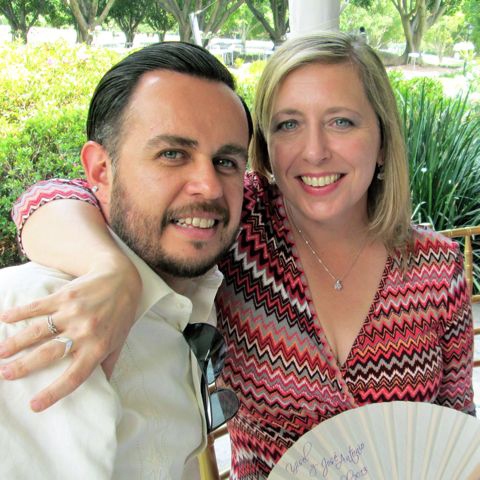Hey folks, I want to introduce you to a new blogger on the scene! Justin decided he was leaving work for good at 33 years old and has been writing some terrific content over at Root of Good for just a few weeks. He was kind enough to host a guest post of mine on his site earlier this week. Be sure to check it out and let me know what you think!
Justin and I share a similar mind-set about pretirement and about focusing our respective web sites on giving you real information straight from the heart. You won’t find a lot of boring lists of regurgitated financial “tips” on either of our sites. And neither of us are afraid of offending anyone. Justin wants to show you how easy it is to leave the corporate world behind for good and he’s off to a great start. I predict big things for his site. He has a great story and is a great writer on top of it. I am honored to be the first site to host a guest post of his anywhere! I hope you enjoy it!
Goodbye work, hello blogging!
I started Root of Good not long after I retired from full time work. I found myself sitting at home with a lot of free time and an interest in finances, early retirement, writing, computers, coding, and technology. I was able to “retire” at the tender age of 33, and I figured I could share my story and provide insight into how I accomplished this feat of financial engineering. One day a couple of weeks into my retirement, one of those crazy ideas crept into my head — I’ll start a blog!
Some people have nagging thoughts like “I really want a pick-up truck, a new boat, and a vacation house on the lake where I can store my new boat”. The nagging thought in my head was “I’m going to start a blog!”. I couldn’t get it out of my head. I resigned myself to spending the next few days investigating “how to blog” to figure out the basics. I had no clue where to even start with blogging.
You have to have a server that provides your carefully written blog posts to all your thousands of readers. You need software that makes your blog look beautiful and helps you manage your content. You’ll have to tweak the appearance of your site to make it conform to your wants and needs. Once you get your site up and running and offering readers the aesthetic experience you are aiming for, you still aren’t done. Unless you are particularly fond of writing soliloquies, you have to figure out how to get readers to surf over to your awesome new blog.
One way to attract readers to your blog is to read other blogs and comment on these other blogs, with the hopes that someone will like your comment and click on your name to find out more about this really clever and interesting commentator. Some aspiring bloggers prefer to carpet bomb the blogosphere with rather shallow comments that lead back to their own blogs in order to get as many clicks as possible.
I took a different approach and focused on finding the most relevant bloggers in my little niche of expertise — financial independence and early retirement. I read these blogs and engaged with the bloggers and their other readers. Since I’m not running my blog like a business (although I love making money!), I prefer to have genuine conversations with interesting people where we can all benefit mutually from sharing knowledge while entertaining each other in the process.
Enter Pretired.org. I was looking around the internet and I found dozens, perhaps hundreds of personal finance blogs of varying quality and usefulness. Nick’s writing sucked me in. I liked his philosophy of “pretirement” since I struggled a bit with defining myself.
One of the first pages at Root of Good was my “About” page. I realized I had to give myself a title in the very first paragraph of the “About” page. Here is what I came up with:
Through careful saving and planning, I managed to accumulate enough wealth to make me financially independent by age 33. I could also be variously described as unemployed, in between jobs, a stay at home dad, retired, or a kept man with a sweet sugar momma. Call me what you want!
“Retired” is a strange word — a sort of verbal shorthand for “financially independent and not working”. “Retired” for a 33 year old is a really strange word. I see many of my friends from high school and college posting on Facebook about how excited they are to be finally finishing up their PhD dissertations or completing their medical residencies. And here I am retired.
Retired or Pretired?
When I composed my “About” page, I had never heard of the concept of “pretirement”. It makes so much sense though. When you retire in your 30s or 40s, you aren’t heading off into the sunset to a life of sitting on the porch in your rocking chair. You probably won’t play any shuffleboard or bingo for at least a few more decades. You are still 15+ years too young for an “active adult” retirement community that frowns on those under age 55.
And let’s face the facts. If you manage to work hard and accumulate enough wealth to retire at a very early age, you probably aren’t cut out for sitting around twiddling your thumbs all day anyway.
Pretirement is a perfect word to describe that period of time after you reach financial independence but before you hit the traditional retirement age of 65. It is one of the few periods of your life that you get to choose what you want to do. You are still healthy enough to climb mountains (in a figurative or literal sense). You still have enough energy to pursue side projects and hobbies, and try out volunteer opportunities that you put off during your working life.
In my situation (as well as Pretired Nick’s), leaving full time work has meant a big increase in how much time we spend with our families. We both have toddlers running around the house, and they take a lot of time and energy. I was busy working a full time job and making money when my other two kids were toddlers. This time around, I won’t miss my kid’s childhood because I was too busy working, or too busy de-stressing from work to give them my undivided attention.
I also view pretirement (or early retirement) as a renaissance of your life. A chance to reinvent your life in whatever form you want it to be. I decided to pursue blogging, which has led to hours of fulfilling work writing blog posts about topics I find interesting. It also led me into the world of coding and tweaking WordPress blog software. I’m currently a novice, which means I have a lot to learn.
I recently spent a few hours reading tutorials and modifying code to enable a certain kind of automated functionality at Root of Good. At first I had trouble getting the code to work like I wanted. After some trial and error and learning the basics of WordPress programming, I eventually got the program to output the web page with the desired appearance. A small victory, but a rewarding feeling to accomplish something new. Now I have a new skill and can build on that skill by taking on more challenging and complex coding issues to tweak Root of Good.
Who knows what these skills will lead to? I may develop my WordPress and PHP skills enough to be able to take on freelance programming work a few hours per week to make some easy cash. I don’t really need the money, but if the money comes easily, why not try to earn a little bit? It’s hard to call it “work” if you make a couple hundred dollars in exchange for a few hours of your time and you are doing something you like.
If that sounds really boring to you, wait till you hear about my other interests! Since retiring, I don’t feel guilty about spending hours watching, reading, or learning about the things that happen to interest me. So far this has included an interest in 16th century Europe. Lately I have been watching period drama TV shows and reading fiction and non-fiction works set in that period.
I also spent a lot of time studying the French language using a free online language instruction program (Duolingo.com for the curious). Lately I have been too busy (imagine that!) to spend much time learning French, but it will be there waiting for me if I find myself wallowing in boredom. Like that will ever happen.
During my full time career, it was difficult to do very much of anything recreational during the work week. My job and my three kids required most of my attention during the week. This left little unscheduled free time to pursue other interests. Now my job is no longer, but I have picked up full time child care duties for our one year old. That still leaves me with a lot of free time during the day, and also allows me to live life more intentionally at a slower pace. I walk the kids to and from school every day, and bring the little one to weekly story times and toddler play times at the community center.
Working for the Man
I have always regarded “work” as an instrumentally valuable activity that provides an income sufficient to fund my wants and needs. Work should also pay well enough to leave a surplus (after my expenses are paid) that I can invest for future use. It is great when work is interesting and provides happiness and satisfaction, as that is an added bonus on top of the paycheck.
Some find work intrinsically valuable — that is, work in and of itself provides value, meaning, and validation to their lives. I suppose I was unlucky during my short career since I never found a position that I considered to be intrinsically valuable. Maybe I should have chosen social work or the medical field instead of engineering. Not that I want to take a mulligan on life at this point!
Work provides money. Money buys freedom. It is a simple transaction in my mind. But the only money that can be put toward your future freedom is the money that you don’t spend.
How much money you spend depends on your wants and your needs. Needs tend to be relatively fixed in price (basic food, water, and shelter). Wants can be highly variable. The trick to being able to retire early is to pay attention to your “wants” and figure out how much value you get out of the “wants”. Some may prefer a shiny new car and a McMansion over the equivalent value invested at an 8-10% rate of return. I’m satisfied driving a 13-year-old compact car and living in a moderately priced house. For others, they may derive great unimaginable value out of living in a fancy car. Whoops, Freudian slip! Living in a fancy car is what you do when you can’t pay your fancy mortgage on your fancy house and it goes back to the fancy bank.
Living Well
The Root of Good family spends around $2,000 per month on our core expenses. Some people are shocked we can keep food on the table let alone live well on this amount of money. We aren’t eating Kobe steaks stuffed with caviar encrusted lobsters every night for dinner. But we eat well enough. Being retired means I have plenty of free time to try new experiments recipes and procure high quality ingredients at low prices. Our house keeps us safe and comfortable. Our cars get us where we need to go. Our minds are occupied with a variety of entertainment and educational options. Our friends (and our kids’ friends) are treated well at social events frequently hosted at our house. We are simply very value conscious consumers living well on a low budget.
By focusing our spending on the things that bring the most value to us while cutting costs in other places that aren’t very important, we have managed to live well and save a significant portion of our earnings each year. These turbocharged savings led to early retirement at 33 for me.
Pretired Nick here again. Well, what do you all think? Does Justin’s story get you dreaming at all? What will you do when you’re done working for good? Are you just bouncing along for the ride or are you deciding what you want to do every day and choosing to do that?







